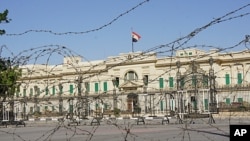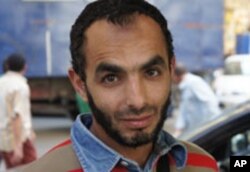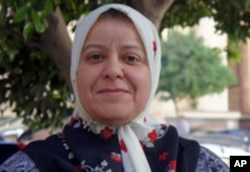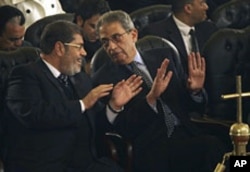Just weeks before Egyptians go to the polls, many voters remain undecided about who should be their first post-revolution president. Their options have narrowed after three leading candidates were disqualified.
The political scene in Cairo these days often seems as chaotic as the city's traffic. On a busy downtown street, potential voters voice their concerns about the barring of front-runners from across the political spectrum.
A supporter of the disqualified Islamist candidate Hazem Salah Abu Ismail says the decision means he won't vote for anyone.
Mohamed Salem says with his Salafist pick gone, he has no plans to go to the polls. If he does, he adds, it will only be to reject the other candidates.
Salem says the ousting was politically motivated, a sentiment shared by many online and on the street - questioning why Abu Ismail, along with former spy chief Omar Suleiman and Muslim Brotherhood candidate Khairat el-Shater have been disqualified. Theories range from the ruling military council trying to split the Islamist vote, to boosting old guard candidate Amr Moussa.
Not everyone sees dark motives in the electoral judges' decision.
Office manager Hala, who gave only her first name, says she trusts the judiciary, one of the few institutions under former President Hosni Mubarak to enjoy a reputation of independence.
She says the judiciary has integrity, and points to what she considers legitimate concerns over the would-be candidates' compliance with candidacy laws.
Political analyst and publisher Hisham Kassem agrees.
“The conspiracy theory is now on everything in Egypt, okay?. But when you look at the work and the way the election committee is conducting its working procedurally, it's clear there are procedural mistakes that they have brought out and made very clear,” he said.
The sense of predictability in Egypt, whether it's that the judiciary will act fairly, or higher powers won't, is countered by some sharp shifts in the political landscape.
The Muslim Brotherhood was long admired for its behind-the-scenes charity works and devotion to Islam, and turned that to success in the parliamentary polls. But with the rise came accountability.
Voter Gamal Ibrahim Mohamed has been disappointed. Mohamed said he supported the Brotherhood during the parliamentary elections, but now their “greed has become apparent.” They just want to seize power for their own interests, he said, adding he will vote for anyone but them.
With al-Shater out, the Brotherhood is now putting forth their reserve candidate, Mohammed Mursi.
Political analyst Kassem believes the electorate will roughly be divided among three candidates: Mursi, whose second-choice status could be offset by the group's devoted following, former Brotherhood member Abdel Moneim Aboul Fattouh, widely respected for his decades of opposition to the former government, and Moussa, who despite being part of the Mubarak team stood out for occasional streaks of independence.
Kassem adds that with the process so new - this is only Egypt's second contested presidential election, and the first that promises to be legitimately so - these general impressions will be key.
“The regular voter is not even someone who can examine a program or an agenda of a candidate, which really means in the end it is going to boil down to personalities," he said. "And in some cases it is going to be if you hold a successful conference or rally and immediately your votes rise and then followed by another which is not good and it brings down your vote.”
Kassem predicts a very unstable next few weeks, and an outcome impossible to forecast.








